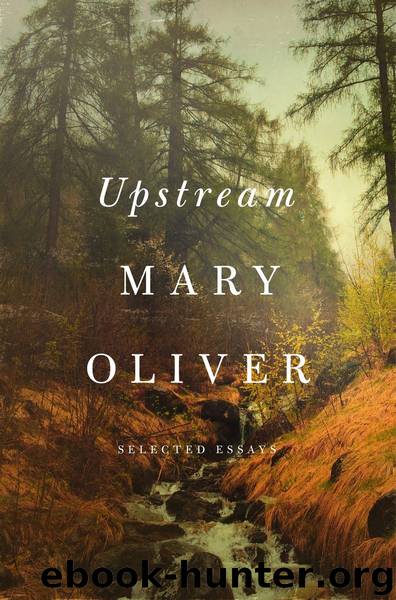Upstream by Mary Oliver

Author:Mary Oliver
Language: eng
Format: epub
Publisher: Penguin Publishing Group
Published: 2016-09-21T09:36:44+00:00
5.
Poe’s work is exquisitely and opulently constructed; the narratives have a fascination that is a sure-hold—a quality that, for lack of another word, one might simply call entertainment. They are frightening—but not in the way that Kafka’s “The Metamorphosis,” for example, or James’s “The Turn of the Screw” is frightening. In spite of the extreme and macabre symbolism in Kafka’s story, both “The Metamorphosis” and “The Turn of the Screw” take place in a world uncomfortably familiar, and the stories unfold, both of them, in a terrifyingly low-key, unextraordinary way. They are, horribly and unmistakably, descriptions of life as we know it, or could easily know it. While Poe’s stories are—stories. Full of the hardware of the nightmare—graves, corpses, storms, moldering castles, catacombs—and hovering always at the edge of tension and incredulity, they never fail to thrill as stories.
But literature, the best of it, does not aim to be literature. It wants and strives, beyond that artifact part of itself, to be a true part of the composite human record—that is, not words but a reality.
Poe’s work opens on this deeper level when we consider what we know about his life. Such consideration is a tricky business. In our own age such investigation and correspondence is, I think, grossly overdone; hardly a literary melancholy these days is explained in any terms but those of personal grievance. But Poe’s case is exceptional. Life-grief was his earliest and his deepest life experience. Not to wonder how deeply it shaped his outlook and his work is to miss something sharply sorrowful, and deeply valiant.
But let us consider the matter in yet another way. Poe’s inability to incorporate loss and move on was not a response born of his experience alone, but was also an invention, an endlessly repeatable dark adventure created by his exceedingly fertile mind. For Poe, in an artistically kaleidoscopic brilliance, does not write only about his own argument with the universe, but about everyone’s argument.
For are we not all, at times, exactly like Poe’s narrators—beating upon the confining walls of circumstance, the limits of the universe? In spiritual work, with good luck (or grace), we come to accept life’s brevity for ourselves. But the lover that is in each of us—the part of us that adores another person—ah! that is another matter.
In the mystery and the energy of loving, we all view time’s shadow upon the beloved as wretchedly as any of Poe’s narrators. We do not think of it every day, but we never forget it: the beloved shall grow old, or ill, and be taken away finally. No matter how ferociously we fight, how tenderly we love, how bitterly we argue, how pervasively we berate the universe, how cunningly we hide, this is what shall happen. In the wide circles of timelessness, everything material and temporal will fail, including the manifestation of the beloved. In this universe we are given two gifts: the ability to love, and the ability to ask questions. Which are, at the same time, the fires that warm us and the fires that scorch us.
Download
This site does not store any files on its server. We only index and link to content provided by other sites. Please contact the content providers to delete copyright contents if any and email us, we'll remove relevant links or contents immediately.
| Diaries & Journals | Essays |
| Letters | Speeches |
The Rules Do Not Apply by Ariel Levy(3897)
Bluets by Maggie Nelson(3704)
Too Much and Not the Mood by Durga Chew-Bose(3689)
Pre-Suasion: A Revolutionary Way to Influence and Persuade by Robert Cialdini(3403)
The Motorcycle Diaries by Ernesto Che Guevara(3325)
Walking by Henry David Thoreau(3227)
What If This Were Enough? by Heather Havrilesky(2943)
The Day I Stopped Drinking Milk by Sudha Murty(2851)
Schaum's Quick Guide to Writing Great Short Stories by Margaret Lucke(2795)
The Daily Stoic by Holiday Ryan & Hanselman Stephen(2703)
Why I Write by George Orwell(2354)
Letters From a Stoic by Seneca(2329)
The Social Psychology of Inequality by Unknown(2303)
A Short History of Nearly Everything by Bryson Bill(2131)
Feel Free by Zadie Smith(2094)
Insomniac City by Bill Hayes(2080)
A Burst of Light by Audre Lorde(1978)
Upstream by Mary Oliver(1930)
Miami by Joan Didion(1877)
